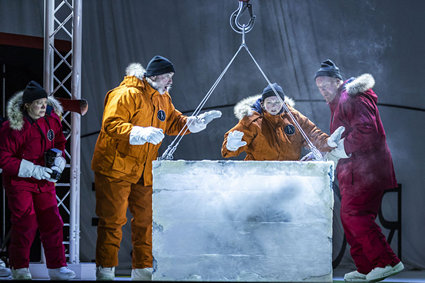| Opera Reviews | 26 April 2024 |
Arctic diversionsby Catriona Graham |
|
| MacRae: Anthropocene
Scottish Opera February 2019 |
|

Sarah Champion (Daisy), Stephen Gadd (Charles), Jeni Bern (Professor Prentice), Mark Le Brocq (Harry King)
|
|
|
On a chilly night in Edinburgh, Scottish Opera strands us in a rapidly freezing Arctic, courtesy of Stuart MacRae and Louise Welsh. On board the good ship King’s Anthropocene are scientists, a journalist and the crew, all funded by Harry King, a Branson-esque character hoping that samples from ancient ice will reveal the origins of life. Anthropocene, the fourth collaboration of MacRae and Welsh, easily fulfills the promise of the early short operas Remembrance Day and Ghost Patrol and has the same supernatural air as The Devil Inside. Macrae’s music tinkles like splintering ice, rumbles like ice-floes bumping against each other. Long-drawn-out notes would be called languorous in another context. Although there are no singalong tunes one leaves the theatre humming, it is lyrical and melodic. All of the cast turn in classy performances, as does the orchestra, conducted by Stuart Stratford, though the stand-out moments are for women’s voices. The purity and volume control of the first sounds of the defrosted girl, Ice (Jennifer France), are astounding. Both the duet between Ice and professor Prentice, and the trio of Ice, Prentice and Daisy are powerful. For Ice, the words and music are fractured, until she has recounted her death. Thereafter, both words and music flow more fluidly. Welsh’s libretto is sharp, witty and conversational. Many of the lines are straightforward, short sentences; some are devastating one-liners. Anent European infecting native Americans with ‘new’ diseases, Charles (Professor Prentice’s husband) remarks that ‘Civilisations coughed and died.’ The story is that the ship becomes ice-bound, waiting for Charles to return; he has found a body frozen in the ice, has cut it out and is bringing it on board. There is a touching duet later, when Prentice (Jeni Bern) and Charles (Stephen Gadd) have a ‘domestic’ in which Prentice says she was about to leave him behind; they kiss, however, and make up beneath the foil blanket. The journalist, Miles (Benedict Nelson) is persuaded by his editor to sabotage the ship’s communications, so that King is stranded – a good story; King (Mark Le Brocq) laments later that his share price is collapsing. Miles manages to deflect the blame onto the ship’s engineer, Vasco (Anthony Gregory). Vasco and the captain, Ross (Paul Whelan) are in many ways the most aware, most realist of the characters, but with all the superstitions of the sea – Vasco observing that no-one is waiting for him, Ross hypersensitive to the weather. Without giving away too much of the plot, it is possible to say that the ending is ambiguous. There is a clear clash of cultures, compounded by a misunderstanding of motives. Director Matthew Richardson, who also designed the lighting, and set and costume designer Samal Blak have created a simple set with white curtains, a gangway on wheels, a surgical table and a couple of concertina doorways. The characters wear colour-coded padded jackets, trousers, boots and gloves, except when they are trying to sleep in white thermals. Outwith the music, on of the few blasts of colour is a glorious aurora borealis in Act 1.
|
|
| Text © Catriona Graham Photo © James Glossop |
|







